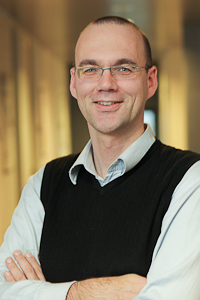Modelling dynamic networks with differential equations
A hacking day of Mathematics for Data Science at the Department of Mathematics
 |
|
Bio
Professor Ernst C. Wit is Professor of Statistics and Data Science at the Università della Svizzera italiana in Lugano, Switzerland. He obtained PhDs in Philosophy (1997, Penn State) and Statistics (2000, University of Chicago) in the US. From 2000 until 2005 he was in the Statistics Department at the University of Glasgow, where he became a Reader. In 2005 he became head of the Medical Statistics Unit (12 FTE) at the University of Lancaster as full professor. As Director he implemented a thriving Master in Statistics programme. From 2008 until 2018 Wit was at the University of Groningen, for the last 4 years as head of the Mathematics Department. Since 2018 he is in Switzerland, where he has continued to work on methodological development in high-dimensional inference with a specific focus on network modelling. He is the author of 120 peer-reviewed publications. He has served as the President of the European Bernoulli Society and as member of the Board of Directors of the International Biometrics Society. He was president of the Dutch Biostatistics Society. From 2016 until 2020 he presided over a European COST Action, entitled COSTNET (CA15109), that dealt with novel methods for statistical network science and that brings together 34 countries and some 500 researchers throughout Europe. He is a founding member of the Data Science and Systems Complexity Center (DSSC), which also established a Data Science Master and a Statistics and Big Data Master, at the University of Groningen. Wit advises the Ministry of Internal Affairs in the Netherlands on statistical matters relating to elections and referendums since 2014. Wit is currently the Director of the Institute of Computing at USI and the director of the Master in Computational Science.Course description
This course is an introduction to the statistical modeling of dynamic networks using differential equations. Our point of departure are quasi-reaction dynamics, that can be modelled using SDEs. We introduce the Gillespie algorithm to simulate such systems and we consider local linear approximation methods for inference. Approximating the mean process by means of an ODE, gives us the large system limit. We introduce an efficient Tikhonov regularizer to infer such systems by means of penalized least squares. In the final lecture, we show how we can generalize the stochastic dynamics to model more general dynamic social systems and we employ survival model techniques to estimate the parameters.
No prior experience with networks is expected, but familiarity with statistical modeling is essential.
Course objectives
By the end of the course, the students will be able to:
- Understand quasi-reaction dynamics and create ODE and SDE stoichiometric models to describe such process.
- Apply local linear approximations and Bayesian methods to infer the kinetic coefficients of the quasi-reaction dynamics.
- Use Tikhonov regularization to infer ODE dynamics.
- Understand how extensions of quasi-reaction dynamics combined with survival analysis can be used to model and infer dynamic social interactions.
Textbooks
- The course will mainly use the notes written by the instructor.
- Useful text on the side: ED Kolaczyk & G Csárdi, Statistical Analysis of Network Data with R (2014) available electronically through SpringerLink
Computation
Most assignments will involve varying combinations of theoretical assignments, data analysis and simulation. For the practical part of the course, we will use R. R can be downloaded for free from cran.r-project.org. Furthermore, a lot of students find it handy to interface R with R-studio, which again can be downloaded for free from: www.rstudio.com.
Schedule
- Wednesday 24 March 2021 @ 16.30-18.30 Quasi-reaction models, Gillespie algorithm, approximations
- Friday 26 March 2021 @ 15.30-17.30 Local linear approximation, Bayesian approaches
- Wednesday 31 March 2021 @ 16.30-18.30 ODE and Tikhonov inference
- Thursday 01 April 2021 @ 10.30-12.30 Relational event modelling
Details
- Participation is free, however a notification by email to Prof. Veronica Vinciotti is mandatory
- For further information, please contact Prof. Veronica Vinciotti
- Venue: Webinar, credentials will be sent to the participants the day before of the event
- Language: English